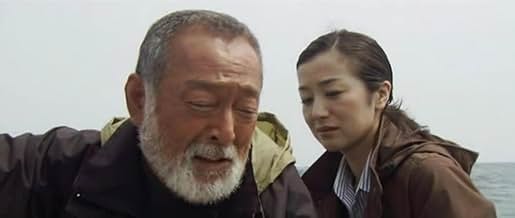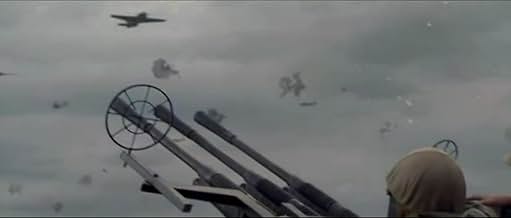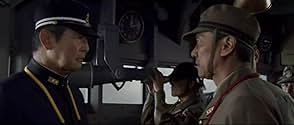CALIFICACIÓN DE IMDb
6.4/10
2.5 k
TU CALIFICACIÓN
La historia de la batalla final y desesperada del Yamato de la Armada Imperial Japonesa, el mayor acorazado de la Segunda Guerra Mundial.La historia de la batalla final y desesperada del Yamato de la Armada Imperial Japonesa, el mayor acorazado de la Segunda Guerra Mundial.La historia de la batalla final y desesperada del Yamato de la Armada Imperial Japonesa, el mayor acorazado de la Segunda Guerra Mundial.
- Premios
- 6 premios ganados y 7 nominaciones en total
Sôsuke Ikematsu
- Atsushi
- (as Sosuke Ikematsu)
Opiniones destacadas
This is not the first time that I saw the sunk of Yamoto in Nippon movie. The precedent movie are "Rengo kantai" (1981), or additionally, some movie relative with Nippon naviation or 'Zero' fighter. With its poor battle result, the Yamoto was not more than a symbol of power, which main function was to satisfy people's adoration need, similar with the enthusiasm to sumotori of Japanese.
Though it praised the braveness of soldiers, it can't bear comparison with "Sink the Bismarck" (1960), in which the defeated Germany wined British's respect (It's ridiculous when a US veteran present his awedness to rival in the start and final of "Lorelei: The Witch of the Pacific Ocean" (2005)).
But this is not a historically narrative film. It also abandon the scanty criticism tradition of Japanese war movie before 90's. The tradition of vagueness of moral sense in Japanese movie is still there. No context was given to transmit the information about the cause to this tragedy, without which the sense of sacrifice to protect others is so pale. The script seemed to cater to the current civil circumstance. So this is a real "anniversary" movie within a predefined frame.
The cast were very good. Despite the unnaturalness of the plot corresponding to modern society, Tatsuya Nakadai is still my favorite actor. It's a pity that Japanese movie is losing its classic art orientation and international influence after the fade of masters directors.
The 3D effect is just so so, light is somewhat dim, and the color is always monotonously the hull's hue. Fortunately, the wave is no longer that appeared in old movie adopt the ship model. Music is better than "Lorelei: The Witch of the Pacific Ocean".
Though it praised the braveness of soldiers, it can't bear comparison with "Sink the Bismarck" (1960), in which the defeated Germany wined British's respect (It's ridiculous when a US veteran present his awedness to rival in the start and final of "Lorelei: The Witch of the Pacific Ocean" (2005)).
But this is not a historically narrative film. It also abandon the scanty criticism tradition of Japanese war movie before 90's. The tradition of vagueness of moral sense in Japanese movie is still there. No context was given to transmit the information about the cause to this tragedy, without which the sense of sacrifice to protect others is so pale. The script seemed to cater to the current civil circumstance. So this is a real "anniversary" movie within a predefined frame.
The cast were very good. Despite the unnaturalness of the plot corresponding to modern society, Tatsuya Nakadai is still my favorite actor. It's a pity that Japanese movie is losing its classic art orientation and international influence after the fade of masters directors.
The 3D effect is just so so, light is somewhat dim, and the color is always monotonously the hull's hue. Fortunately, the wave is no longer that appeared in old movie adopt the ship model. Music is better than "Lorelei: The Witch of the Pacific Ocean".
I am almost through a great book on the history of Japan in WWII. The naval battles are fascinating to read about, and so when I saw this movie in the local Asian mall I picked it up.
Yamato (the old name for Japan) has good and bad points. Starting with the good - I find the story fascinating, how the remainder of the Second fleet made a run for Okinawa on a mission that everyone knew was suicide due to lack of air support (Japan's air force had been finally crushed at Saipan). Some of the acting was great; I thought Uchida really stood out. As far as I can tell the film was very historically accurate. Some of the insights into "bushido" were interesting, especially the admiral's explanation of bushido vs. English chivalry. And some of the effects were pretty good too.
On the bad side... the film had kind of a made-for-TV movie feel. As I said, some of the effects were good, others were far from great. The director shied away from showing the large sections of the ship, or the whole ship, maybe because of lack of budget - but I found myself really wanting to see those shots of this 65,000 ton superbattleship. It was obvious the whole film was made in a studio. They really should have invested in substantial steel tubes for the anti-aircraft guns, the fact that they jittered around like toys bothered me. Also in the silent dialog scenes, there should have been an omnipresent rumble of the ship's engines to add to the illusion that we are on the largest battleship in the world.
It wasn't great, but I enjoyed it anyway, and anyone else who is interested in Japanese naval history I think will also enjoy it despite its shortcomings.
Yamato (the old name for Japan) has good and bad points. Starting with the good - I find the story fascinating, how the remainder of the Second fleet made a run for Okinawa on a mission that everyone knew was suicide due to lack of air support (Japan's air force had been finally crushed at Saipan). Some of the acting was great; I thought Uchida really stood out. As far as I can tell the film was very historically accurate. Some of the insights into "bushido" were interesting, especially the admiral's explanation of bushido vs. English chivalry. And some of the effects were pretty good too.
On the bad side... the film had kind of a made-for-TV movie feel. As I said, some of the effects were good, others were far from great. The director shied away from showing the large sections of the ship, or the whole ship, maybe because of lack of budget - but I found myself really wanting to see those shots of this 65,000 ton superbattleship. It was obvious the whole film was made in a studio. They really should have invested in substantial steel tubes for the anti-aircraft guns, the fact that they jittered around like toys bothered me. Also in the silent dialog scenes, there should have been an omnipresent rumble of the ship's engines to add to the illusion that we are on the largest battleship in the world.
It wasn't great, but I enjoyed it anyway, and anyone else who is interested in Japanese naval history I think will also enjoy it despite its shortcomings.
I am so disappointed to see some posters turning their reviews into cold historical commentary. Did this film not teach you anything? I couldn't help but be immensely moved by this film. It steers well clear of overly political and historical commentary and focuses on the young sailors and their loved ones. The hardship of the Japanese in the second world war was not unlike any other nations' peoples' hardship. Their loved ones went to war and never returned; they lost their livelihoods and what they loved; they were powerless to the whims of their leaders.
This film shows People. People in tragic times. People fighting for their loves and their lives. Whether it is Yamato, Saving Private Ryan, The Thin Red Line, Brotherhood, Stone's trilogy, Eastwood's duo of films, etc, it comes down to people trying to live. So much has been said about the film that is political but I ask you, what is the point of doing so for a film that strove so hard to in favour of a human story? After years of revisionist Hollywood war films, it is ironic that this moving film, Yamato, be raked over coals for inaccuracies or romanticism.
Besides this, however, and a technical note, the film's visual effects are excellent for a non-Hollywood film. I wouldn't be surprised if Yamato was one of the most expensive Japanese films ever made. While making an ocean going battleship replica was not an option, the sets, miniatures and CGI create a very gritty and realistic feeling of being aboard the fated ship.
Musically the film is also very striking and has some memorable themes throughout. The sound track is also superb with excellent separation in the 5.1 channels. The battle scenes are especially vivid in their aural presentation.
The amount of heart, work and effort that went into the film is clear from the exceptional cast, sound and competent visuals and their passionate and honest performances and work. This is definitely a film for the world to see. It is not a war film about "war"; it is a film about love. The message rings loud and clear until the final note of the closing credit's song.
This film shows People. People in tragic times. People fighting for their loves and their lives. Whether it is Yamato, Saving Private Ryan, The Thin Red Line, Brotherhood, Stone's trilogy, Eastwood's duo of films, etc, it comes down to people trying to live. So much has been said about the film that is political but I ask you, what is the point of doing so for a film that strove so hard to in favour of a human story? After years of revisionist Hollywood war films, it is ironic that this moving film, Yamato, be raked over coals for inaccuracies or romanticism.
Besides this, however, and a technical note, the film's visual effects are excellent for a non-Hollywood film. I wouldn't be surprised if Yamato was one of the most expensive Japanese films ever made. While making an ocean going battleship replica was not an option, the sets, miniatures and CGI create a very gritty and realistic feeling of being aboard the fated ship.
Musically the film is also very striking and has some memorable themes throughout. The sound track is also superb with excellent separation in the 5.1 channels. The battle scenes are especially vivid in their aural presentation.
The amount of heart, work and effort that went into the film is clear from the exceptional cast, sound and competent visuals and their passionate and honest performances and work. This is definitely a film for the world to see. It is not a war film about "war"; it is a film about love. The message rings loud and clear until the final note of the closing credit's song.
The movie has a very touching human side, an a sinister historic side.
The human story inside the story also is moving.
The major flaw of it, is that is too long. It gets unnecessary and frequently lost in details.
The human story inside the story also is moving.
The major flaw of it, is that is too long. It gets unnecessary and frequently lost in details.
Screenplay of this movie (of course in Japanese) is excellent and I was enough convinced by its story - why we are living, who fought for the country. It was great tragedy that only 15-17 years old boys required to fight in the war without knowing the meaning/reason of life. This movie (or original book written by Jun Henmi) is now my recommendation to know there were people who fought for our country.
I am not racist nor nationalist. I also am not right wing. I oppose to any wars by any mean. But, I respect the men who fought for us and it is sad that we don't know much about the fact we are living on where these men protected.
I voted this as "5" for actors/actress are not that super... Theme song as the same... Understanding they did their best, but level of acting is miserable. The battle scenes are great.
Sometime it's too stereotype to illustrate the story (ie. Geisha & Japanese Gamble ... that's almost the all the Japanese movie does).
I am not racist nor nationalist. I also am not right wing. I oppose to any wars by any mean. But, I respect the men who fought for us and it is sad that we don't know much about the fact we are living on where these men protected.
I voted this as "5" for actors/actress are not that super... Theme song as the same... Understanding they did their best, but level of acting is miserable. The battle scenes are great.
Sometime it's too stereotype to illustrate the story (ie. Geisha & Japanese Gamble ... that's almost the all the Japanese movie does).
¿Sabías que…?
- TriviaPart of the foredeck and port side of the Yamato were reconstructed to full scale for the exterior scenes. As the Japan Building Standards Act interfered with re-creating the ship's entire superstructure, images of a one-tenth scale model of the Yamato at its namesake museum in Kure were used in post-production.
- ErroresThe ship is seen firing salvos from its main batteries aimed at approaching US aircraft on several occasions, while lots of the crew are visible on deck, manning the light AA guns as well as performing other duties. While the big guns were in fact used fending off aircraft, at least during the last battle off Okinawa, the shock wave from the blast of the nine 460 mm barrels (the biggest ever on a warship) could kill or severely injure an unprotected sailor, it was therefore forbidden to remain on deck on such occasions.
- Citas
Mamoru Uchida: [Firing an AA gun defiantly as the ship sinks] I'm not done yet! My last throw!
Selecciones populares
Inicia sesión para calificar y agrega a la lista de videos para obtener recomendaciones personalizadas
- How long is Yamato?Con tecnología de Alexa
Detalles
- Fecha de lanzamiento
- País de origen
- Sitio oficial
- Idioma
- También se conoce como
- The Pacific Battleship: Yamato
- Locaciones de filmación
- Productoras
- Ver más créditos de la compañía en IMDbPro
Taquilla
- Total a nivel mundial
- USD 39,287,114
- Tiempo de ejecución2 horas 25 minutos
- Color
- Mezcla de sonido
- Relación de aspecto
- 2.35 : 1
Contribuir a esta página
Sugiere una edición o agrega el contenido que falta












